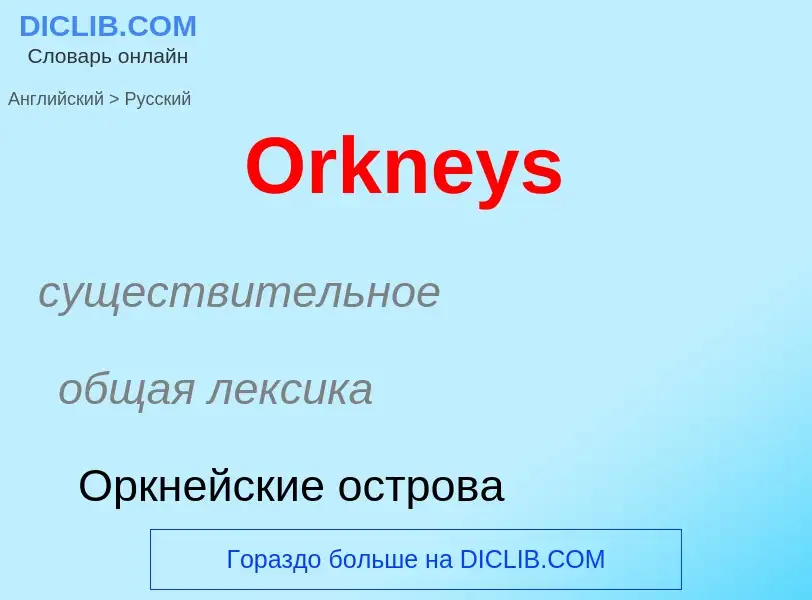Перевод и анализ слов искусственным интеллектом ChatGPT
На этой странице Вы можете получить подробный анализ слова или словосочетания, произведенный с помощью лучшей на сегодняшний день технологии искусственного интеллекта:
- как употребляется слово
- частота употребления
- используется оно чаще в устной или письменной речи
- варианты перевода слова
- примеры употребления (несколько фраз с переводом)
- этимология
Orkneys - перевод на русский
существительное
общая лексика
Оркнейские острова
['ɔ:kni]
существительное
общая лексика
Оркни (графство в Шотландии)
география
Оркни (графство Шотландии)
Википедия
Orkney (; Scots: Orkney; Old Norse: Orkneyjar; Norn: Orknøjar), also known as the Orkney Islands, is an archipelago in the Northern Isles of Scotland, situated off the north coast of the island of Great Britain. Orkney is 10 miles (16 km) north of the coast of Caithness and has about 70 islands, of which 20 are inhabited. The largest island, the Mainland, has an area of 523 square kilometres (202 sq mi), making it the sixth-largest Scottish island and the tenth-largest island in the British Isles. Orkney's largest settlement, and also its administrative centre, is Kirkwall.
Orkney is one of the 32 council areas of Scotland, as well as a constituency of the Scottish Parliament, a lieutenancy area, and an historic county. The local council is Orkney Islands Council, one of only three councils in Scotland with a majority of elected members who are independents.
The islands have been inhabited for at least 8,500 years, originally occupied by Mesolithic and Neolithic tribes and then by the Picts. Orkney was colonized and later annexed by the Kingdom of Norway in 875 and settled by the Norsemen. In 1472, the Parliament of Scotland absorbed the Earldom of Orkney into the Kingdom of Scotland, following failure to pay a dowry promised to James III of Scotland by the family of his bride, Margaret of Denmark.
In addition to the Mainland, most of the remaining islands are divided into two groups: the North Isles and the South Isles. The climate is relatively mild and the soils are extremely fertile; most of the land is farmed, and agriculture is the most important sector of the economy. The significant wind and marine energy resources are of growing importance; the amount of electricity that Orkney generates annually from renewable energy sources exceeds its demand.
The local people are known as Orcadians; they speak a distinctive dialect of the Scots language and have a rich body of folklore. Orkney contains some of the oldest and best-preserved Neolithic sites in Europe; the "Heart of Neolithic Orkney" is a designated UNESCO World Heritage Site. Orkney also has an abundance of marine and avian wildlife.


.jpg?width=200)
![Excavations by [[UHI Archaeology Institute]] at the Ness of Brodgar have contributed to Orkney's [[heritage tourism]]. Excavations by [[UHI Archaeology Institute]] at the Ness of Brodgar have contributed to Orkney's [[heritage tourism]].](https://commons.wikimedia.org/wiki/Special:FilePath/Dig at the Ness of Brodgar in August 2018 c.jpg?width=200)

![Harald Fairhair]] (on the right, with fair hair) took control of Orkney in 875. He is shown here inheriting his kingdom from his father [[Halfdan the Black]], in an illustration from the ''[[Flateyjarbók]]''. Harald Fairhair]] (on the right, with fair hair) took control of Orkney in 875. He is shown here inheriting his kingdom from his father [[Halfdan the Black]], in an illustration from the ''[[Flateyjarbók]]''.](https://commons.wikimedia.org/wiki/Special:FilePath/Flateyjarbok Haraldr Halfdan.jpg?width=200)
![Hoy High Lighthouse]] on [[Graemsay]] Hoy High Lighthouse]] on [[Graemsay]]](https://commons.wikimedia.org/wiki/Special:FilePath/Hoy Lighthouse RLH.jpg?width=200)
![Margaret]], whose betrothal led to Orkney passing from Norway to Scotland. Margaret]], whose betrothal led to Orkney passing from Norway to Scotland.](https://commons.wikimedia.org/wiki/Special:FilePath/James III and Margaret of Denmark.jpg?width=200)
![[[St Magnus Cathedral]] in Kirkwall [[St Magnus Cathedral]] in Kirkwall](https://commons.wikimedia.org/wiki/Special:FilePath/Kirkwall cathedral.jpg?width=200)
![[[Midhowe Broch]] on the west coast of [[Rousay]] [[Midhowe Broch]] on the west coast of [[Rousay]]](https://commons.wikimedia.org/wiki/Special:FilePath/Midhowe Broch.jpg?width=200)


![The [[Old Man of Hoy]] The [[Old Man of Hoy]]](https://commons.wikimedia.org/wiki/Special:FilePath/OldManofHoycloseJM.jpg?width=200)

![Satellite image taken by [[Sentinel-2]] Satellite image taken by [[Sentinel-2]]](https://commons.wikimedia.org/wiki/Special:FilePath/Orkney Islands by Sentinel-2.jpg?width=200)

![EMEC's]] wave testing site off Billia Croo EMEC's]] wave testing site off Billia Croo](https://commons.wikimedia.org/wiki/Special:FilePath/Pelamis at EMEC.jpg?width=200)
![King Olaf Tryggvason]] of Norway, who forcibly Christianised Orkney.<ref name=T69/> Painting by [[Peter Nicolai Arbo]]. King Olaf Tryggvason]] of Norway, who forcibly Christianised Orkney.<ref name=T69/> Painting by [[Peter Nicolai Arbo]].](https://commons.wikimedia.org/wiki/Special:FilePath/Peter nicolai arbo, olaf tryggvasson king.jpg?width=200)
![[[Ring of Brodgar]], on the island of [[Mainland, Orkney]] [[Ring of Brodgar]], on the island of [[Mainland, Orkney]]](https://commons.wikimedia.org/wiki/Special:FilePath/RingofBrodgarJM.jpg?width=200)
![Seals hauled out at Lyrie Geo on [[Hoy]] Seals hauled out at Lyrie Geo on [[Hoy]]](https://commons.wikimedia.org/wiki/Special:FilePath/Seals hauled out by Lyrie Geo, Hoy, Orkney - geograph.org.uk - 2472901.jpg?width=200)
![[[Stromness]] on the Mainland is the second-largest settlement in Orkney. [[Stromness]] on the Mainland is the second-largest settlement in Orkney.](https://commons.wikimedia.org/wiki/Special:FilePath/Stromness 2.jpg?width=200)
![The [[Italian Chapel]] on [[Lamb Holm]] was built and decorated by Italian prisoners of war working on the [[Churchill Barriers]].<ref name=Thom434/> The [[Italian Chapel]] on [[Lamb Holm]] was built and decorated by Italian prisoners of war working on the [[Churchill Barriers]].<ref name=Thom434/>](https://commons.wikimedia.org/wiki/Special:FilePath/The altar art of the Italian chapel of Orkney - geograph.org.uk - 739607.jpg?width=200)
